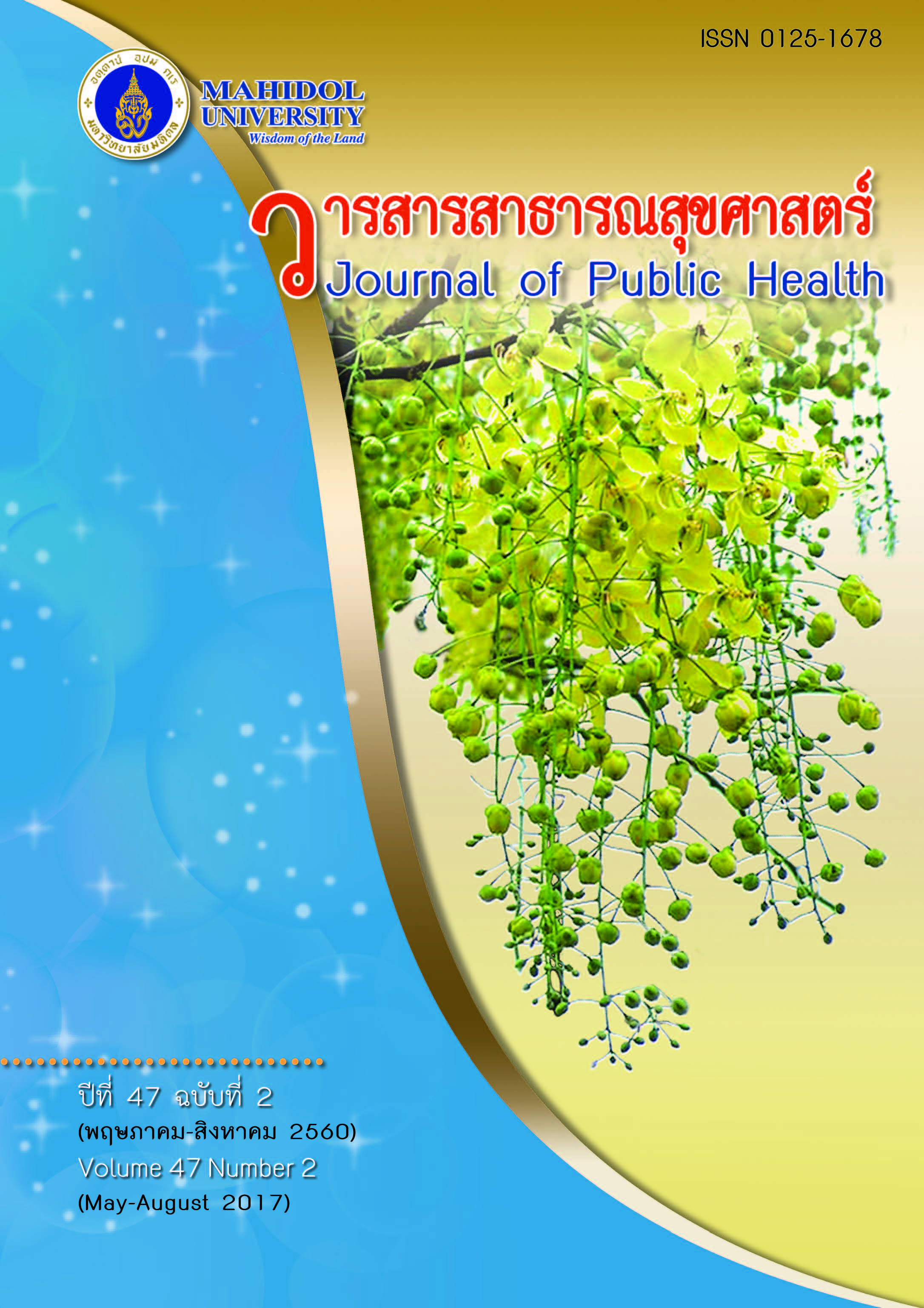ผลของโปรแกรมการจัดการตนเองสำหรับการฟื้นฟูสมรรถภาพปอดในผู้ป่วยโรคปอดอุดกั้นเรื้อรัง
Keywords:
ปอดอุดกั้นเรื้อรัง, COPD, ฟื้นฟูสมรรถภาพปอด, การจัดการตนเอง, chronic obstructive pulmonary disease, pulmonary rehabilitation, self-managementAbstract
การฟื้นฟูสมรรถภาพปอดเป็นวิธีการรักษาโรคปอดอุดกั้นเรื้อรังที่ให้ประสิทธิผลเป็นอย่างยิ่ง การฟื้นฟูสมรรถภาพปอดที่บ้านร่วมกับการจัดการตนเองจะช่วยให้ผู้ป่วยส่วนใหญ่ได้รับการฟื้นฟูสมรรถภาพปอดโดยการออกกำลังกายอย่างมีประสิทธิผล การวิจัยนี้ได้ศึกษาประสิทธิผลของโปรแกรมการจัดการตนเอง เพื่อส่งเสริมพฤติกรรมการออกกำลังกายสำหรับฟื้นฟูสมรรถภาพปอด รูปแบบการศึกษาเป็นการวิจัยกึ่งทดลองแบบสองกลุ่ม วัดผลก่อนและหลังการทดลอง กลุ่มตัวอย่างเป็นผู้ป่วยโรคปอดอุดกั้นเรื้อรังจำนวน 40 คน ที่รับบริการที่โรงพยาบาลศิริราช โดยการสุ่มคัดเลือกและแบ่งเป็นกลุ่มทดลองและกลุ่มเปรียบเทียบกลุ่มละ 20 ราย กลุ่มทดลองได้เข้าร่วมกิจกรรมการเรียนรู้ การฝึกทักษะ และการเสริมสร้างความสามารถแห่งตน ได้รับโทรศัพท์ติดตามและเสริมแรง และได้รับคู่มือการออกกำลังกายสำหรับใช้ทบทวนและจดบันทึกการออกกำลังกายที่บ้าน ดำเนินการทดลอง 6 สัปดาห์และติดตามผล 6 สัปดาห์ วิเคราะห์ข้อมูลด้วยสถิติเชิงพรรณนา, Z-test, Independent t-test, Mann Whitney U-test, Paired t-test และ Wilcoxon matched pairs signed-rank test พบว่า หลังการทดลอง กลุ่มทดลองมีความรู้ ความสามารถแห่งตน พฤติกรรมการออกกำลังกาย และความสามารถทางกายมากกว่าก่อนทดลองและมากกว่ากลุ่มเปรียบเทียบอย่างมีนัยสำคัญ (p < 0.05) ดังนั้นโปรแกรมนี้จึงสามารถนำไปใช้ฟื้นฟูสมรรถภาพปอดในผู้ป่วยโรคปอดอุดกั้นเรื้อรังได้
The Effectiveness of a Self-management Program for Pulmonary Rehabilitation of Patients withChronic Obstructive Pulmonary Disease
Pulmonary rehabilitation is the most effective therapeutic option for Chronic Obstructive Pulmonary Disease (COPD). Pulmonary rehabilitation at home with self-management will help the majority of patients with COPD to rehabilitate their lungs effectively through exercise. This experimental research aimed to assess the effectiveness of a self-management program with the application of Kanfer’s concepts of self-management to promote exercise behaviors for pulmonary rehabilitation. The study employed two groups of a pre-/posttest quasi-experimental research design. The study subjects comprised patients with COPD receiving medical services at Siriraj Hospital of which 40 were randomly selected and equally assigned to either an experimental or a comparison group. The experimental group was required to participate in learning activities, skill training, and self-efficacy enhancement; to receive telephone contact to monitor and reinforce and an exercise handbook to review and record exercise practices at home. The program was implemented for six weeks with six weeks follow-up. Data were analyzed by descriptive statistics, Z-test, Independent t-test, Mann Whitney U-test, Paired t-test and Wilcoxon matched pairs signed-rank test. The results showed that the experimental group had significant improvements in knowledge, self-efficacy, exercise behaviors and physical ability than before the experiment than the comparison group (p <0.05). Therefore, this program can be used to assist patients with COPD.
Downloads
Published
Issue
Section
License
Creative Commons License CC-BY-ND


